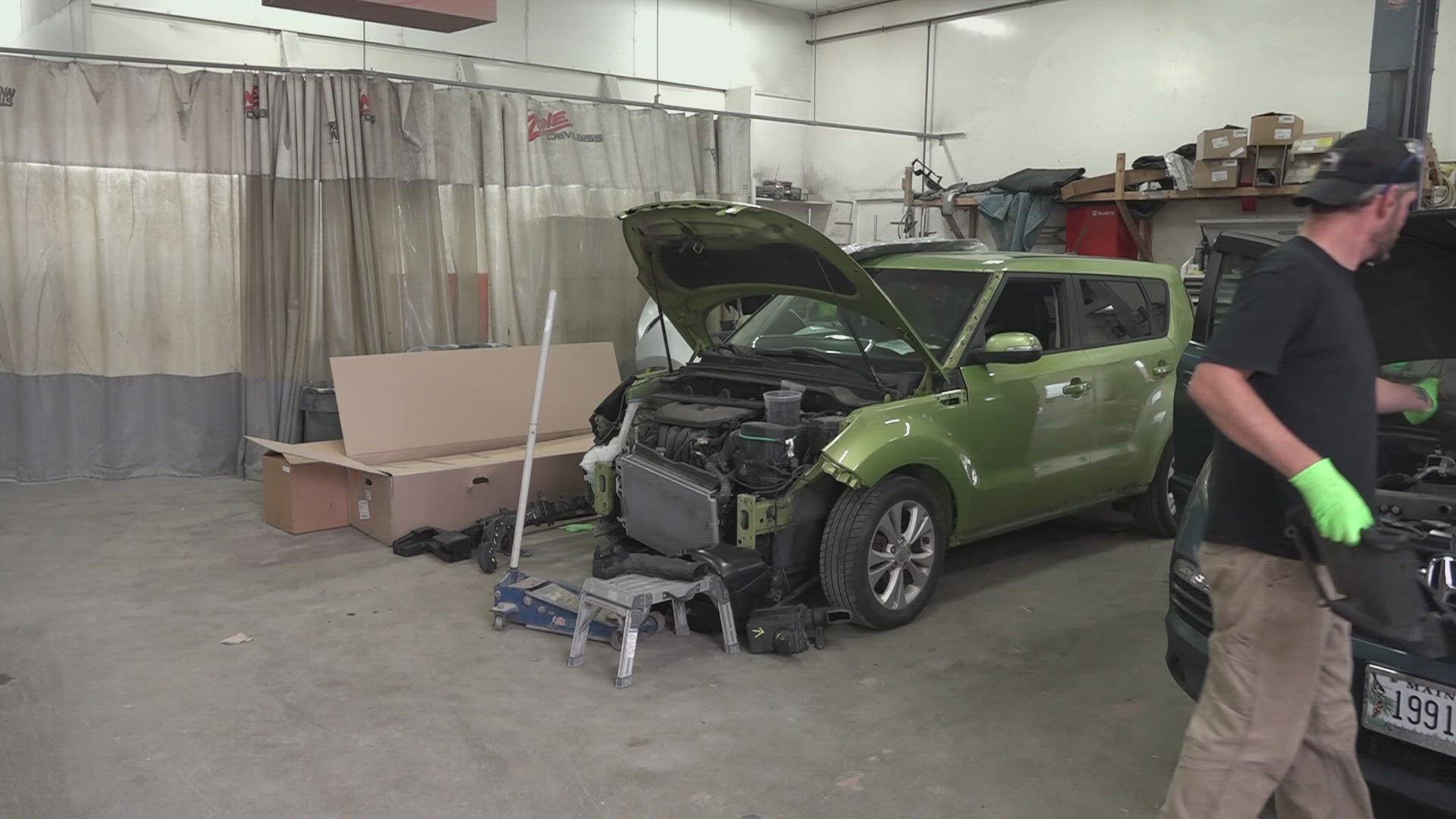BANGOR, Maine — Auto body shops are extremely backed up, and according to shop owners, getting car parts is a pain.
Supply chain issues took a heavy toll on the car industry during the pandemic. J C Autobody's general manger Kyle Leighton said.
For many, life has reset and returned to some form of normalcy. But auto technicians and mechanics are still struggling to make quick turnarounds for customers.
Some customers are forced to wait as long as six months for auto technicians to complete body work jobs. Leighton said some parts take longer to come in than others.
"Large body panels, doors, those kinds of things tend to take longer than the smaller, more common parts, Lamps, bumpers, those kinds of things we can normally get quicker," Leighton said.
Most repairs at Leighton's shop are taking a little longer than a week, and he said he has about 85 cars on his lot that need fixes.
General manager of Maine Collision Center Sean Sullivan said he has about 41 cars on his lot right now, and some repairs at his shop can take anywhere from three to four months.
He said a repair can even take six months to complete if auto technicians have to wait for approval from insurance companies before they move forward with making repairs on a customer's car.
Sullivan said in addition to waiting on parts, the complex makeup of newer cars also extends repair times. Sullivan said cars are now made with multiple high tech safety features, backup and front bumper cameras and more. He said when a car is damaged in an accident, it often needs computer reprogramming and recalibration, forcing body shops to lean on dealerships for help.
"So as simple as a bumper replacement, we have to recalibrate those," Sullivan said. "We have a technician here who comes in and does them for us, or we have to send them to the dealer and try to get into their system to reprogram there, which most dealerships are booked out two to three months."
Sullivan said insurance companies are doing more virtual adjustments and inspections, which aren't accurate. When cars arrive at his shop, technicians have to break the car all the way down, often finding more problems than what the insurance company originally assessed.
"The average bumper job, you used to say, 'Oh drop it off today. We'll paint it today. We'll have it on there tomorrow, and we'll get you going,'" Sullivan said.
He said at first glance, it may look like a car just has simple damage to the bumper or the exhaust, but when technicians get under the hood and pull the car apart, they later find damaged sensors, malfunctioning cameras and.
"The bumper will go in so far and pop back out and look fine, but it can crush everything else behind," Sullivan said. [The insurance company] just writes it and gets it off their desk and says, 'go see a body shop'. But when it comes in here, they might write $1,000 worth of damage. We'll tear it apart and it'll be $6,000 worth of damage."
Sullivan said when body shops find additional damage, they have to order more parts. But now with the current Union Auto Workers (UAW) strike, Leighton said car parts will soon be unavailable if the strike isn't quickly resolved.
"Most of the warehouses, from my understanding, are on strike as well," Leighton said. "So, they don't have people to package and ship the parts. A lot of the manufacturing plants are on strike, so new parts aren't being produced. So, even the parts we can get will run out eventually."
Leighton said originally, he would order parts that technicians at his shop need for jobs anywhere from two to three weeks ahead of time, but when he found out about the UAW strikes, he started to order parts two to three months out.
With manufacture plants and warehouses on hold, shops may have to start using more used parts for repairs. But Leighton said used parts will also become exhausted at some point.
Sullivan said used parts aren't what they used to be. He said parts are often no good because some mechanics remove the parts from cars improperly.
Sullivan and Leighton said they often do temporary repairs for customers who need to have their cars repaired sooner while they wait for parts to come in.
Sullivan said his shop is booked up until the end of December, and with only about five certified body repair shops in Greater Bangor, customers who need complex repairs but who don't already have an existing appointment might have to wait until next year to be serviced.

